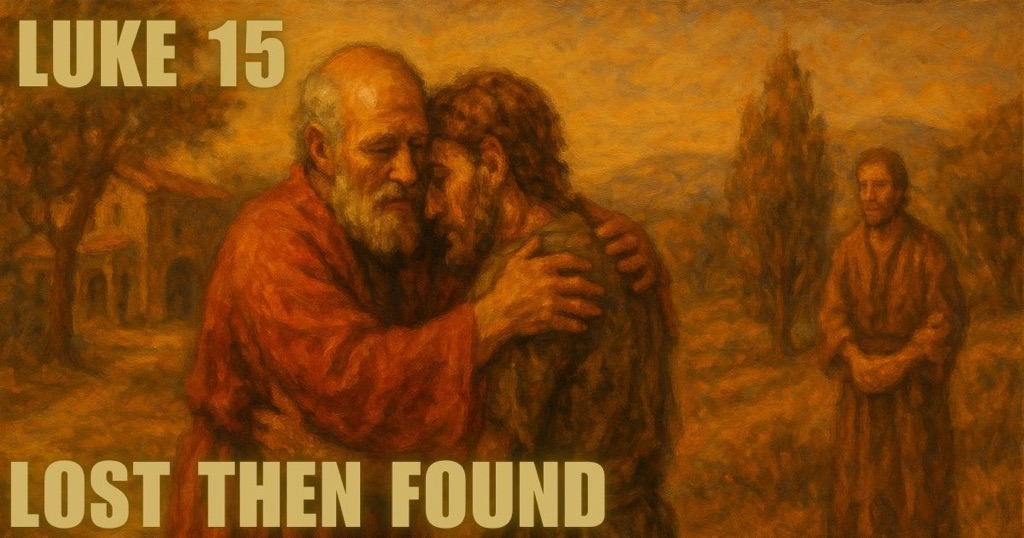In a world that often measures value by achievement or status, Luke 15 offers a profoundly different lens. It’s a chapter centered on loss—lost sheep, lost coins, and lost sons—but more importantly, it’s about the relentless love of a God who seeks and celebrates when what was lost is found. These parables speak across generations and remind us that no matter how far we stray, there is joy and restoration awaiting us.
The Setting: Who’s in the Crowd?
Luke 15 begins with a mixed crowd: tax collectors, sinners, disciples, and the ever-critical Pharisees. The so-called “outcasts” were drawn to Jesus, captivated by His radical message. Meanwhile, the religious elite grumbled, questioning why Jesus would associate with those deemed unworthy. This tension sets the stage for three parables that peel back layers of divine compassion.
The Lost Sheep: Every One Matters
Jesus begins with the parable of the lost sheep. A shepherd leaves ninety-nine to find the one that wandered. It’s not efficiency that drives him—it’s love. The story isn’t about livestock management; it’s about individual worth.
This image of the shepherd joyfully carrying the sheep on his shoulders encapsulates divine kindness. We might think, “Well, he still had 99,” but Jesus tells us the joy in heaven is over the one that was found. The takeaway is simple but powerful: God sees every person as irreplaceable.
It’s also a personal story for many. The narrator reflects on being that lost sheep—resisting faith, avoiding God—until something shifted in college. Like the sheep, she was found and carried home.
The Lost Coin: Searching with Purpose
Next, we meet a woman who loses one of her ten silver coins. She lights a lamp, sweeps the house, and searches diligently. When she finds it, she calls her friends to rejoice. Again, the theme is clear: something precious was lost, and its return is worth a celebration.
This parable emphasizes intentional pursuit. Just as the woman didn’t shrug and say “Oh well, I have nine,” God doesn’t give up on those who stray. For anyone who’s ever felt unseen, this is a deeply affirming truth.
The Lost Sons: A Tale of Two Hearts
Perhaps the most famous of the three is the parable of the prodigal son. A younger son asks for his inheritance early—a cultural insult tantamount to wishing his father dead. He squanders it all and ends up feeding pigs, a job abhorrent to any Jewish listener. Broken and hungry, he rehearses a speech and returns home, expecting nothing more than servanthood.
But the father sees him from afar—because he’s been watching. He runs, embraces him, and restores him. The story could end here, a classic redemption arc. But it doesn’t.
There’s an older brother—dutiful, obedient, and seething with resentment. “I’ve done everything right,” he protests. “Why does he get a party?” His bitterness exposes a different kind of lostness: pride.
Both sons are lost—one in rebellion, the other in self-righteousness. And yet the father loves them both. He doesn’t just rescue the reckless; he pleads with the prideful. This is not just a story of forgiveness, but of invitation into grace for all.
Applying Luke 15 Today: Found, But Still Seeking
These parables are not distant metaphors—they’re deeply relevant. In our lives, we’ve all been the lost sheep, the missing coin, the wandering child. But sometimes, we’re also the older brother, resenting grace extended to others, believing our goodness entitles us to more.
The key is to remember: being “found” is not a one-time event. We continue to wander in small ways—pride, fear, control—and Jesus keeps seeking us. The celebration in heaven is not limited to conversion but includes every moment we turn back toward God.
This chapter also challenges how we view others. Do we welcome the returning prodigal, or do we cross our arms like the older brother? Are we willing to celebrate the restoration of others, even if they’ve messed up?
Takeaways: Lessons from the Lost and Found
- Every person matters deeply to God. No one is too insignificant or too far gone.
- God actively seeks the lost. His love is not passive; it pursues.
- Restoration is celebrated. Heaven rejoices over even one who turns back.
- Self-righteousness can blind us to our own need for grace.
- There’s room in God’s family for everyone—wanderers and rule-keepers alike.
Conclusion: A Love That Keeps Looking
Luke 15 is a love letter from God to anyone who’s ever felt lost, unloved, or undeserving. It paints a picture of divine joy, of a shepherd who searches, a woman who sweeps, and a father who runs. It asks us to reflect—on our own journey and how we treat others on theirs.
We are all on a lifelong path of being found again and again. May we remain humble enough to be carried when needed and joyful enough to celebrate others’ return. Because the heart of God is always for the lost—and that means all of us.

